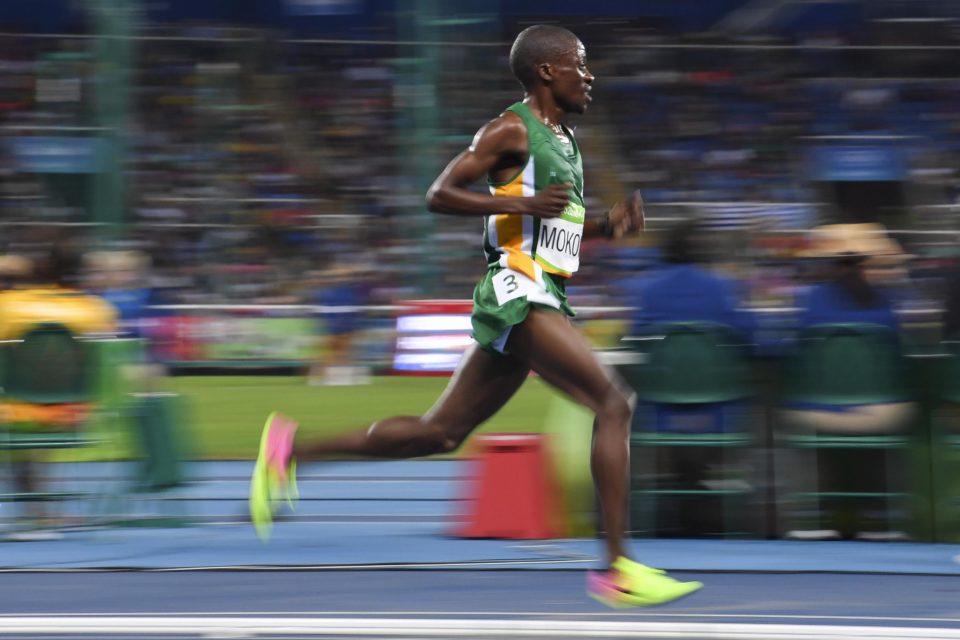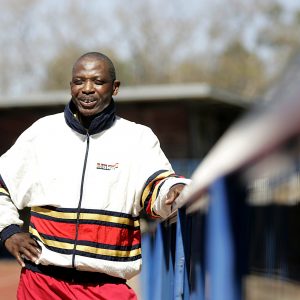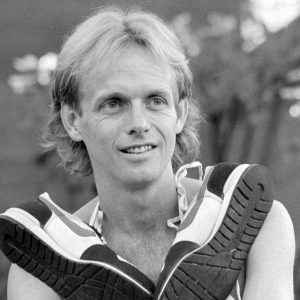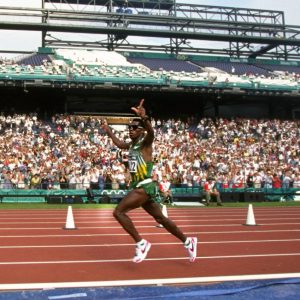Stephen Mokoka, just your ‘average’ runner
Despite what he may say, this talented South African runner has a shot at Olympic glory come the marathon on the final day of the Games.
Author:
6 August 2021

Ask any running enthusiast to describe Stephen Mokoka and the one adjective you’re highly unlikely to hear, even if you asked a million enthusiasts, is “average”.
This, after all, is a man who boasts running accomplishments that are the stuff of many an athlete’s dreams. He is the national champion of multiple distances in cross-country, track and road running. And he holds the country’s record for the half marathon.
Mokoka is the standard to which many runners aspire but few reach. He has represented South Africa since his days as a student and as he continues to do so in the twilight of his illustrious career, it is unlikely anyone will match him in the near future.
So, imagine the shock when Mokoka refers to himself using that very word. “I am an average runner, anyway,” he says flippantly.
Related article:
Take two, please. Did you just refer to yourself as average?
We are sitting in the stands of the stadium at the Tshwane University of Technology in Pretoria and Mokoka has just completed an intense training session with other members of the Sponge Group that he leads. Some of them are still busy training while others are sitting next to us, chatting loudly.
Their noise notwithstanding, I heard Mokoka all right.
The man who recently finished seventh at the World Half Marathon Championships. Average? An athlete who boasts the second-fastest marathon time in South Africa. Average?
Related article:
“Look, of course I’ve managed to make the breakthrough to race overseas. But I have not done anything special, that’s why I call myself average. Yes, some people might say, ‘But you’ve run a 59,’” says Mokoka, referencing the national record he set in Argentina in August 2019, when he ran 21.1km in 59 minutes, a time he improved by 15 seconds in Poland late last year.
“Yes, I’ve broken Hendrick’s [Ramaala] record. But the Americans and the Kenyans are running that time [sub 59] too. So that’s nothing. I’ve not done anything special yet,” he says, then shouts at the runners on the track below: “How did you do in this one? Good, keep going.”
He then moves to somehow ridicule his impressive showing at the World Half Marathon Championships that he ran in Poland in October.
“Finishing seventh is nothing because if I go to Nike and try to sign a contract, they will say to me, ‘But the athletes who finished second and first belong to us. Why should we have you?’ That means I must leave Nike and go to Adidas and they too will say, ‘Let’s see, but we have athletes who finished ahead of you in that race.’ That’s why I call myself an average runner.”
Lessons from Doha
Even at home, where he is celebrated, Mokoka says he is not yet worthy of adoration.
“My career is not escalating the way I’d wanted it to. I am not where I am supposed to be,” he laments. “But it is by God’s grace and the people I work with, who support me, that people see me as a great athlete. I am just hoping that in the last years of my career I can grow. There are people who mature later and I hope that I can mature later as well.”
That maturity has been in evidence on this unusually cool Pretoria afternoon, as he continuously interrupts his training session to help the younger athletes with theirs. Even as we speak, he repeatedly excuses himself to pass on pearls of running wisdom from his many years competing on the international circuit.
Those years, though, have yet to yield the goal that “average” Mokoka so desires.
“I wish I already had a global medal by now. I look at my role model Hendrick and I see that he has won the New York Marathon and at the World Half [Marathon Championships], he has two silver medals from there. And for me, looking at it, I believe I should have been there, gotten a global medal. But I’ve not given up and I am hoping I can get it later. But my career is okay. I am an average runner anyway, although I had wanted to be one of the best decorated athletes in the world. My dream was to be a great athlete all over Africa and in the world. It has not happened yet, but I hope that in future it will.”
Related article:
Mokoka came pretty close to that global medal two years ago, at the World Championships in Doha. “But I’d gone to Doha to win, not to finish fifth,” he retorts.
But what average runner goes to such an event aiming to win?
His failure to finish on the podium still rankles and Mokoka acknowledges that he could have done better. But he knows where he went wrong.
“Experience is the mother of success,” he says, and then quickly stands up to shout further instructions to the runners on the track.
“Doha was Doha,” he returns. “I think what killed me in Doha was confidence. I was too confident. The year prior to Doha, I told myself I was going to win a gold medal somewhere around April, May. I didn’t even think somebody could touch me in Doha. I looked at the pace I could keep and how my body was reacting when I was running and I knew no one was going to beat me. I even told the guys I was training with that I was going to win gold. I think what killed me was confidence. If I wasn’t too confident, I could have behaved properly.”
‘There is no athlete that I fear’
The lesson from Doha will stand him in good stead, he says. “I gained experience in Doha … the conditions were tough and they needed a tough man. I was tough but they [the men who finished ahead of him] were tougher than me. I always say, if it is the day I am supposed to be winning, no one’s going to beat me, and I believe Doha was not the day for me. I hope one day God has the day for me.”
Could that day be 8 August in Sapporo, during the last event of the Tokyo 2020 Olympics? Mokoka says his ultimate goal in his second marathon at the Games is to get a medal. But he is a realist as well.
“At the Olympics, I just want to find myself improving from 49th place,” he says, which he achieved at the 2012 Games in London. “The Olympics are very different, conditions can be very horrible. You don’t just wake up and do as you feel. And Tokyo is going to be very hot, so I am hoping my body can cope. If my body copes, my dream is to finish the marathon. That’s the first goal. The second goal is to improve on the 49th place. But the ultimate goal is to get the medal.”
Not a goal for average runners, right?
Related article:
“The bar has been set high in this country. Bab’ Josiah [Thugwane] has won gold [at Atlanta in 1996]. That’s my wish too, to get a medal. And while this is a different era from back then, I realise that they were not too fast in winning. It’s just that they managed to control themselves and managed the conditions on race day … I am putting my body through hell at all times [in training] and I believe the effort I put in will work for me.”
A former African champion in the 10 000m, he is looking to that victory from 2016 for inspiration ahead of his Olympic race against the likes of defending champion Eliud Kipchoge.
“When I won the Africa Champs, no one except the East Africans used to win in that event. But a guy from southern Africa won that day and they were like, ‘How does this happen?’ So I believe that one day I’m going to get a global medal and in the marathon specifically. I always tell the guys that I respect the marathon but there is no athlete that I fear. If you are faster than me, you are faster than me. That’s okay. But I know that the marathon can humble you. No athlete can claim they can never be beaten. The confidence I have for the marathon is very different from any other event. I believe I still have a lot of chances to win a global medal and I’m going to get it.”
When he toes the line in Sapporo early on Sunday 8 August for his second Olympics marathon, Mokoka will do so with just as good a chance as the likes of Kipchoge to win the gold medal. And there’s nothing average about having the potential to finish on the podium in the final event of the Games, is there?




